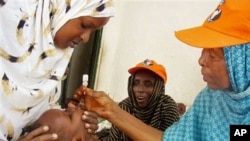A new combination vaccine is showing promising results in controlling the crippling and sometimes fatal disease of polio, which has defied more than two decades of a global eradication campaign.
There are three variations of polio, so the campaign to wipe out the disease has been using a vaccine that protects against all three strains. But the World Health Organization's Roland Sutter says that the triple, or 'trivalent' vaccine is, in effect, overkill.
"Type 2 has not been seen in over 10 years, so we think this is eradicated worldwide," Sutter explained. "And so we thought, maybe by taking Type 2 out, we could have a much better vaccine against the remaining types, Type 1 and Type 3."
To test the concept, researchers vaccinated about 900 healthy newborn babies in India. Some got monovalent vaccines, good against only one type of polio. Others got a new bivalent vaccine to protect against Types 1 and 3, and the rest got trivalent vaccines for all three polio strains.
The study confirmed that the Type 2 vaccine actually reduces the effectiveness of the more important Type 1 and 3 vaccines when given all together.
"Basically in this study we showed that the bivalent [vaccine] is much better than the trivalent," Sutter said in a telephone interview from Geneva. "We get about 30-40 percent more immunity [from] the bivalent compared to the trivalent for Type 1 and Type 3," and just about as good as the monovalent vaccines, which protect against only one strain of polio.
Although Sutter and his colleagues have just published their research in the British medical journal, The Lancet, their findings have already been translated into a change in practice in areas where polio remains endemic. In India, up to this time last year, there were 464 cases. "And now we have 39. In Nigeria there were 381, and now we have eight."
Polio is a stubborn disease, so there's no guarantee that this new bivalent vaccine will succeed where previous ones failed. But it does give the worldwide campaign against polio a new weapon in its effort to wipe out the disease once and for all.




